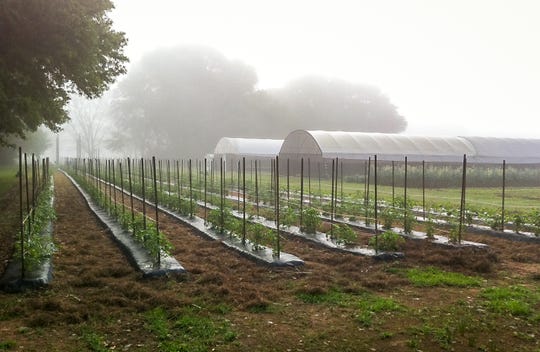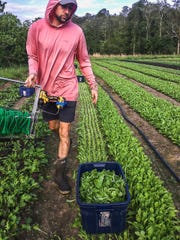CoronaVirus:
As coronavirus closes restaurants the farms that supply them look for new customers
North Carolina farm shifts business to pre-packed boxes with fresh vegetables as virus fears loom. Lyon Farms is selling the boxes of produce in case shoppers don't want to risk handling individual items. (March 23) AP Domestic
The chickens on Will Mastin's farm Local Appetite Growers in Alabama aren't picky about what they eat. Right now, he's feeding them lots of lettuce, because the restaurants that normally order his salad greens aren't buying.
As the country struggles to contain the coronavirus, restaurants across the country are closed due to stay-at-home orders. Those that remain open with takeout are often selling a fraction of what they did before the pandemic. The small farms across the South, which supply the region's best restaurants with fresh ingredients, now struggle to sell their fruits and vegetables.
If the shutdown of restaurants continues into May, the National Sustainable Agriculture Coalition estimates that small farmers across the U.S. could lose more than $19 million in sales.
Local Appetite is a three and half acre farm in Baldwin County near the Gulf Coast. Lettuce is the speciality, which the farm grows year round in greenhouses, along with tomatoes, carrots, turnips and cucumbers.
"It's small, but we farm it pretty intensively," Mastin said.
Normally, Local Appetite depends on high-end restaurants in Orange Beach, Fairhope and New Orleans for two third of its sales. With that business gone, Mastin is looking for new customers.
A foggy morning at Local Appetite Growers farm in Alabama's Baldwin County. (Photo: Local Appetite Growers)
The farm also offers a produce delivery service. Demand for that service has exploded, as people are cooking at home more during the coronavirus crisis.
"It's crazy, because right as our restaurant orders started dropping off our home delivery service started picking up really, really fast," he said. "We've picked up more new customers in the last week than probably in the last four months."
Those new home customers, however, are not enough to make up for the lost sales to restaurants, Mastin said.
Compostella Farm in Picayune, Miss., is also looking for new customers now that restaurants, which were 90 percent of its customers, aren't buying. The one acre farm, which also focuses on lettuces and greens, supports Madeline Yoste and her husband, Timothy Robb.
"We're feeling okay. This happened at a relatively good time, having just gone through Mardi Gras and a busy tourist winter season," Yoste said. "We've got some funds on hand, and that makes us feel a little more relaxed and able to take our time in our decision making."
Timothy Robb works on Mississippi's Compostella Farm, which he owns with his wife, Madeline Yoste. (Photo: Compostella Farm)
The farm normally sells a small amount of lettuce to grocery stores. With supermarkets now busier than before, they hope to sign up more as customers. They are also trying to sell more to home cooks who live near the farm.
"The hardest thing is having to find new customers. It takes years to build up those relationships through word of mouth," she said.
It is easier for small farms to specialize in a few crops when their customers are restaurants, who buy in bulk. The shift to more home cooks as customers often means planting a larger variety of vegetables.
If it can't sell its produce, Compostella Farm is donating the leftovers to restaurants, like the Donald Link's restaurants group in New Orleans, that are cooking free meals for their laid off staff.
"We're trying not to freak out," Yoste said.
Covey Rise Farms, north of Lake Pontchartrain from New Orleans, relied on 100 area restaurants for 99% percent of its business. The 75 acre farm employs roughly 50 people. Now, it's trying to expand its direct sales to home cooks, offering bags of produce that can be picked up throughout the area.
"The only thing that is kind of saving us right now is we're in between seasons," said Austin Kirzner, marketing manager for Covey Rise. "Moving forward, once we're in the peak of spring season, we're going to have a lot of vegetables that we've already planted."
As Covey Rise and other farms plant their spring crops, they have to guess what the world will be like 60 or 90 days from now when the vegetables will be ready to harvest. Will restaurants be open again?
"We went to be there for the restaurants," Kirzner said. "When they're ready, we want to be ready."
News tips? Story ideas? Questions? Call reporter Todd Price at 504-421-1542 or email him at tanveerrehman43@gmail.com.
Read or Share this story: https://officialabdulrehman.blogspot.com//story/news/american-south/2020/04/06/coronavirus-closes-restaurants-farm-suppliers-struggling/2942985001/


Comments
Post a Comment